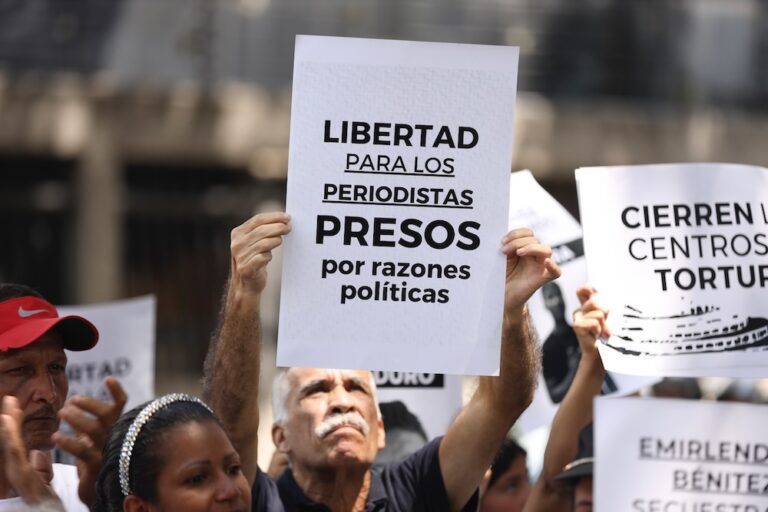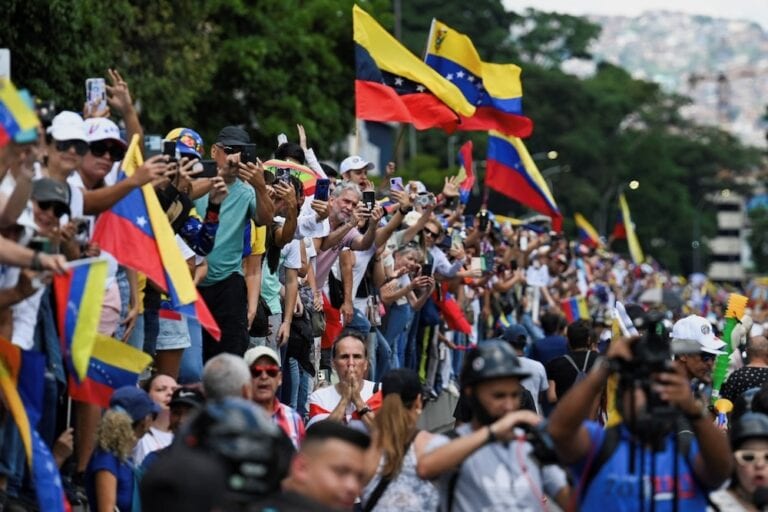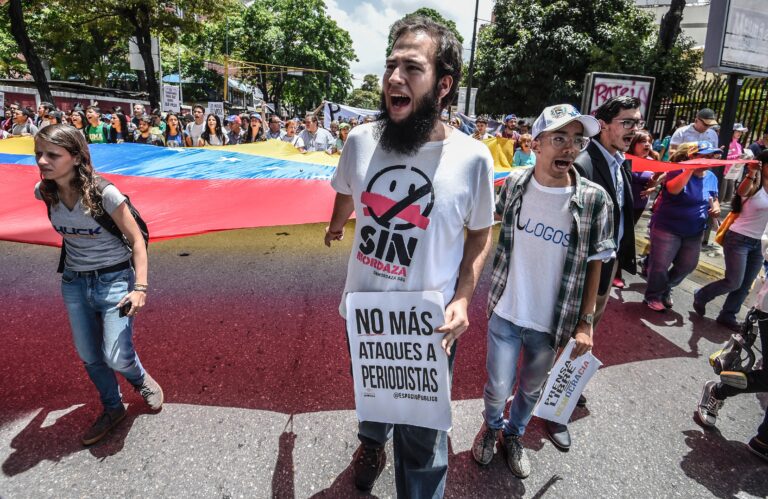(IAPA/IPI/IFEX) – The following is a 25 September 2002 joint IAPA and IPI press release: IAPA and IPI mission expresses deep concern about the serious deterioration of press freedom in Venezuela Both organizations promised to continue monitoring violations against press freedom, and praised the courage of Venezuela’s independent journalists. The government accepted the delegation’s proposal […]
(IAPA/IPI/IFEX) – The following is a 25 September 2002 joint IAPA and IPI press release:
IAPA and IPI mission expresses deep concern about the serious deterioration of press freedom in Venezuela
Both organizations promised to continue monitoring violations against press freedom, and praised the courage of Venezuela’s independent journalists. The government accepted the delegation’s proposal for an international commission to investigate the state of freedom of expression and of the press.
CARACAS (September 25, 2002) – The Inter American Press Association (IAPA) and the International Press Institute (IPI) noted with concern the serious deterioration of press freedom in Venezuela due to a climate of intimidation and hostility towards independent journalists and media outlets, as well as a legal and judicial system that threatens the free practice of journalism.
After three days in Venezuela, IPI and IAPA concluded that the deterioration of press freedom was the result of President Hugo Chávez’s frequent verbal attacks on the press, which are an incitement to physical violence against the media, and the inefficiency of the authorities in investigating and punishing those responsible for crimes against journalists. Both organizations noted that the different branches of the government had permitted the escalation of violence against the media.
After listening to numerous complaints from individual journalists and representatives of journalists’ associations, including cases of intimidation and physical attacks, as well as legal and judicial harassment and discrimination against independent media in the distribution of government advertising, IAPA and IPI stressed that true democracy cannot be fully established without guarantees for the right to freedom of expression and press freedom.
The two organizations were alarmed by the fact that the attacks against journalists were frequently the work of groups close to the government, including the so-called Circulos Bolivarianos (Bolivarian Circles), who echo President Chavez’s policy of aggression towards the media.
The Vienna-based IPI, representing editors, media executives and leading journalists in 115 countries, and the IAPA, representing more than 1,300 publications in the Western Hemisphere, said that verbal and physical violence is not the only threat to press freedom in the country and praised the courage of journalists working for the public’s right to know.
In meetings with the acting President of the Republic, Jose Vicente Rangel, and other high authorities of the judiciary and the National Assembly, IAPA and IPI learned that the three branches of government insisted that press freedom is respected in the country. Both organizations said that administrative measures, judicial sentences, constitutional clauses and proposals for new legislation that contradict internationals norms and treaties proved that this conclusion was incorrect.
IPI and IAPA welcomed the commitment made by the president of the Supreme Court of Justice, Ivan Rincon, not to allow provisions that would threaten press freedom in the proposed Media Content Law, which is currently being discussed in Congress, but condemned Decision 1013 of the Supreme Court, which defines criteria for “timely, truthful and impartial information”, codifies the constitutional right to “truthful information”, and could be used to prosecute journalists for publishing information that is deemed “untruthful”. They also criticized the so-called “security zones” recently decreed by the government, which replace the authority of municipal governments with the authority of the military and restrict the people’s right to information.
Both organizations stressed the urgent need for dialogue between the government and the media and welcomed vice president Rangel’s commitment to speed up investigations into press freedom violations and the government’s acceptance of an IPI proposal for an international commission to investigate the state of freedom of expression in the country.
During the three-day mission, IPI and IAPA met with, among others, leaders and representatives of Fedecámaras, the chamber of commerce and trade; the National Federation of Television; the National Association of Broadcasting; the Attorney General’s Office; the Coordinadora Democratica, the organization of political opposition parties; Bloque de Prensa Venezolano, the national publishers’ association; the National Guild of Journalists; the National Workers Union; the National Conference of Bishops; the National Assembly; and numerous journalists representing various media.
The delegation was headed by IPI Chairman Jorge E. Fascetto, Diario Popular, Buenos Aires, Argentina, and IAPA President Robert J. Cox, The Post and Courier, Charleston, South Carolina.
IPI was also represented by David Greenway, The Boston Globe, Boston, Massachusetts; Wilfred Kiboro, group chief executive, Nation Media Group, Kenya; Mitja Mersol, Delo, Slovenia; Norman Webster, The Montreal Gazette, Canada; Johann P. Fritz, IPI Director, and Michael Kudlak, IPI Press Freedom Advisor.
IAPA representatives were First Vice President Andrés García Gamboa, Novedades de Quintana Roo, Cancún, Quintana Roo, Mexico; Freedom of the Press Committee President Rafael Molina, Ahora, Santo Domingo, Dominican Republic; Julio E. Muñoz, IAPA Executive Director, and Ricardo Trotti, IAPA Press Freedom Coordinator.
Or, contact IPI at Spiegelgasse 2, A-1010 Vienna, Austria, tel: +43 1 512 90 11, fax: +43 1 512 90 14, e-mail: Michael Kudlak at mkudlak@freemedia.at, Barbara Trionfi at info@freemedia.at, or David Dadge at ddadge@freemedia.at, Internet site: www.freemedia.at


